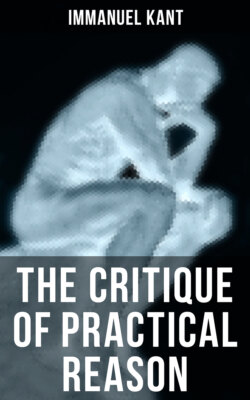Оглавление
Immanuel Kant. THE CRITIQUE OF PRACTICAL REASON
THE CRITIQUE OF PRACTICAL REASON
Reading suggestions
Table of Contents
Preface
Introduction. Of the Idea of a Critique of Practical Reason
First Part. Elements of Pure Practical Reason
Book I. The Analytic of Pure Practical Reason. Chapter I. Of the Principles of Pure Practical Reason
I. Definition
II. Theorem I
III. Theorem II
IV. Theorem III
V. Problem I
VI. Problem II
VII. Fundamental Law of the Pure Practical Reason
VIII. Theorem IV
I. Of the Deduction of the Fundamental Principles of Pure Practical Reason
II. Of the Right that Pure Reason in its Practical use has to an Extension which is not possible to it in its Speculative Use
Chapter II. Of the Concept of an Object of Pure Practical Reason
Chapter III. Of the Motives of Pure Practical Reason
Book II. Dialectic of Pure Practical Reason. Chapter I. Of a Dialectic of Pure Practical Reason Generally
Chapter II. Of the Dialectic of Pure Reason in defining the Conception of the “Summum Bonum”
I. The Antinomy of Practical Reason
II. Critical Solution of the Antinomy of Practical Reason
III. Of the Primacy of Pure Practical Reason in its Union with the Speculative Reason
IV. The Immortality of the Soul as a Postulate of Pure Practical Reason
V. The Existence of God as a Postulate of Pure Practical Reason
VI. Of the Postulates of Pure Practical Reason Generally
VII. How is it possible to conceive an Extension of Pure Reason in a Practical point of view, without its Knowledge as Speculative being enlarged at the same time?
VIII. Of Belief from a Requirement of Pure Reason
IX. Of the Wise Adaptation of Man’s Cognitive Faculties to his Practical Destination
Second Part. Methodology of Pure Practical Reason
Conclusion
Отрывок из книги
Immanuel Kant
Introduction. Of the Idea of a Critique of Practical Reason
.....
I have no fear, as regards this treatise, of the reproach that I wish to introduce a new language, since the sort of knowledge here in question has itself somewhat of an everyday character. Nor even in the case of the former critique could this reproach occur to anyone who had thought it through and not merely turned over the leaves. To invent new words where the language has no lack of expressions for given notions is a childish effort to distinguish oneself from the crowd, if not by new and true thoughts, yet by new patches on the old garment. If, therefore, the readers of that work know any more familiar expressions which are as suitable to the thought as those seem to me to be, or if they think they can show the futility of these thoughts themselves and hence that of the expression, they would, in the first case, very much oblige me, for I only desire to be understood: and, in the second case, they would deserve well of philosophy. But, as long as these thoughts stand, I very much doubt that suitable and yet more common expressions for them can be found.6
In this manner, then, the a priori principles of two faculties of the mind, the faculty of cognition and that of desire, would be found and determined as to the conditions, extent, and limits of their use, and thus a sure foundation be paid for a scientific system of philosophy, both theoretic and practical.
.....
